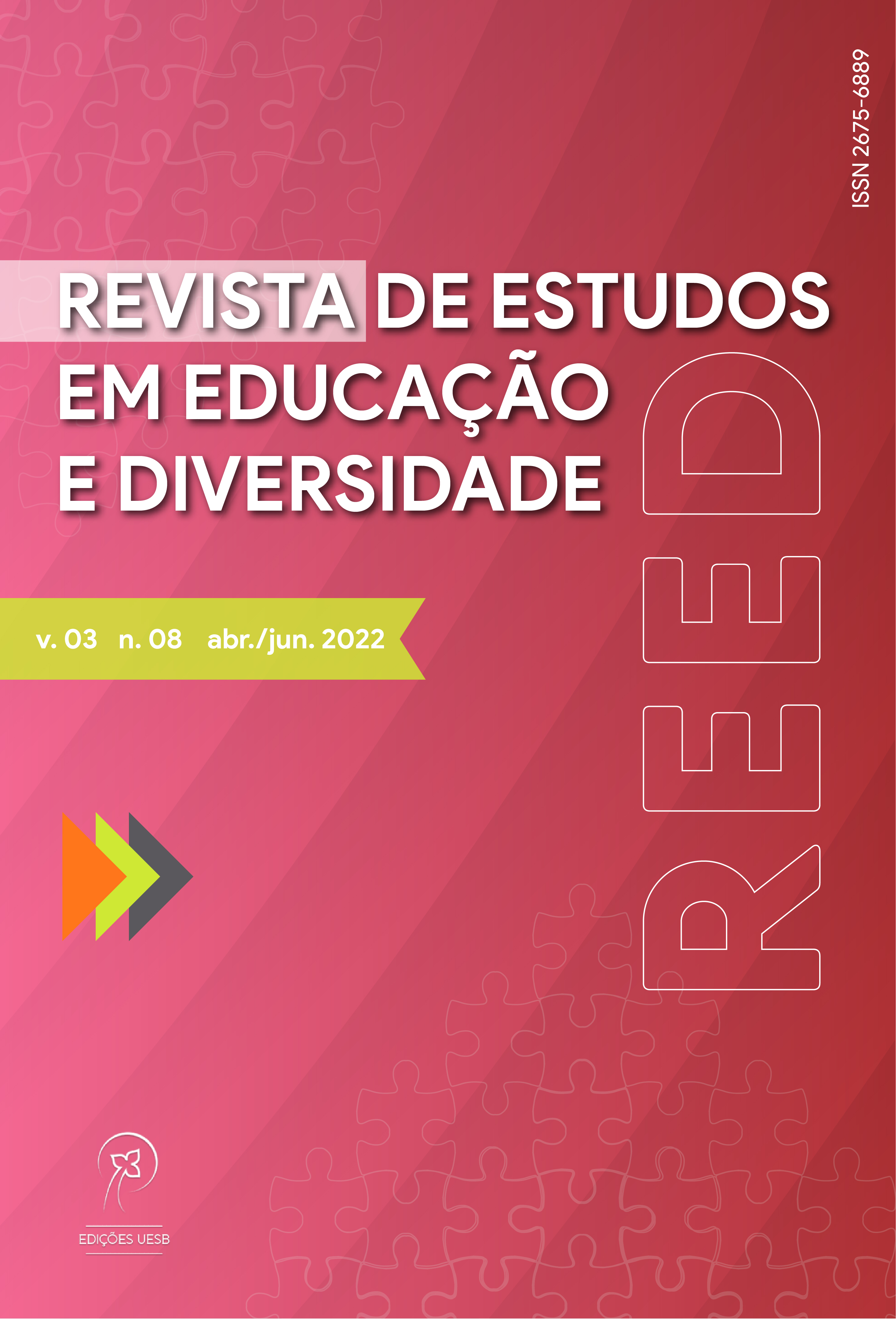THE INVERTED CLASSROOM IN ENGINEERING TEACHING: A REFLECTIVE ANALYSIS OF THE METHODOLOGICAL ASSUMPTIONS CORRELATION TO TEACHING SKILLS
DOI:
https://doi.org/10.22481/reed.v3i8.10897Keywords:
National Engineering Curriculum Guidelines, Teaching Competencies, Flipped classroomAbstract
In view of the updating of the graduate's profile, the skills and competences provided for in the Engineering Curriculum Guidelines, and, together with the increase in the offer of Engineering courses in Brazil, it was necessary to think about training based on the use of active methodologies in the teaching process. This article, with a qualitative methodological approach, is developed with the general objective of understanding which teaching skills and competences are considered important for teachers, as well as the relationship between their development in the flipped classroom. A questionnaire was applied to eight professors of the Engineering courses, whose professionals teach in two units of the same private institution of Higher Education. Data analysis, from the semi-structured questions, were analyzed through the categorization and coding of qualitative data, proposed by Gibbs (2009). The guiding question of the research focuses on: according to the teachers' perception, which teaching skills are developed by the active methodology of the flipped classroom? As for the results, the teachers believe the following proposals are: leadership skills, planning, teamwork and autonomous learning, necessary for the teaching process, which can be developed through the inverted classroom method.
Downloads
References
BERGMANN, J.; SAMS, A. Sala de aula invertida: uma metodologia ativa para aprendizagem. Tradução de Afonso Celso de Cunha Serra. Rio de Janeiro: LTC, 2008.
BRASIL. Ministério da Educação. Conselho Nacional de Educação. Conselho Pleno. Resolução nº 2, de 1º de julho de 2015. Diário Oficial da União, Brasília, DF, 02 jul. 2015. Seção 1, p. 8-12.
BRASIL. Ministério da Educação. Conselho Nacional de Educação. Parecer Homologado. Despacho do Ministro, publicado do D. O. U. de 23/4/2019, Seção 1, Pág. 109. Diário Oficial da União, Brasília, DF, 23 abr. 2019. Seção 1, p. 109.
CONSELHO FEDERAL DE ENGENHARIA E AGRONOMIA – COFEA. Disponível em:
http://ws.confea.org.br:8080/EstatisticaSic/ModEstatistica/Pesquisa.jsp?vw=AnoRegistro. Acesso em: 25 jun. 2018.
CRAWLEY, E. F. Creating the CIDIO SYLLABUS, a universal template for engineering education. 32 nd. ASEE/IEE Frontiers in Education Conference. Boston, Massachusetts: [s.n.]. nov. 2002.
FACULDADE ANHANGUERA DE BRASÍLIA. Projeto Pedagógico do Curso de Engenharia Civil – PPC. 2016.
GIBBS, G. Análise de dados qualitativos. Porto Alegre: Artmed, 2009.
LISBOA, A. P. Cursos de engenharia serão reestruturados; proposta é analisada pelo CNE. Correio Brasiliense, 15 set. 2018. Eu, estudante. (Colaboração de Neyrilene Costa, estagiária).
LOPES, C. S. G. Aprendizagem ativa na formação do engenheiro: a influência do uso de estratégias de aprendizagem para aquisição de competências baseada em uma visão sistêmica. 2016. Tese (Doutorado em Engenharia de Produção) – Universidade de São Paulo, São Carlos, 2016.
MASETTO, M. Competência pedagógica do professor universitário. São Paulo: Sammus, 2003.
OLIVEIRA, V. F. de; ALMEIDA, N. N. de. Retrospecto e atualidade da formação em Engenharia. In: OLIVEIRA, V. F. de (Org.). Trajetória e estado da arte da formação em Engenharia, Arquitetura e Agronomia – volume I: Engenharias. Brasília: Instituto Nacional de Estudos e Pesquisas Educacionais Anísio Teixeira, Conselho Federal de Engenharia, Arquitetura e Agronomia, 2010. p. 21-50.
PERRENOUD, P. Dez novas competências para ensinar. Porto Alegre: Artmed, 2000.
SIMON, F. O. Habilidades e competências em engenharia: criação e validação de um instrumento. Dissertação (Mestrado em Educação) – Universidade Estadual de Campinas, Campinas, 2004.
SILVEIRA JUNIOR, C. R. da. Sala de aula invertida: por onde começar? Instituto Federal
de Goiás, nov. 2020. Disponível em: https://ifg.edu.br/attachments/article/19169/Sala%20de%20aula%20invertida_%20por%20on
de%20come%C3%A7ar%20(21-12-2020).pdf. Acesso em: 18 jun. 2022.
SISTEMA E-MEC. Disponível em: http://emec.mec.gov.br/. Acesso em: 27 maio 2022. UNIDERP, Universidade Anhanguera. Plano de Desenvolvimento Institucional. Disponível em: https://www.uniderp.br/uniderp/pdf/mec/PDI_Uniderp_2016-2020_1525468618_pdi.pdf. Acesso em: 18 jun. 2022.
VALENTE, J. A. A sala de aula invertida e a possibilidade do ensino personalizado: uma experiencia com a graduação em midialogia. In: BACICH, L.; MORAN, J. (Org.).
Metodologias ativas para uma educação inovadora: uma abordagem teórica e prática. Porto Alegre: Penso, 2018. p. 26-44
Downloads
Published
How to Cite
Issue
Section
License
Copyright (c) 2022 Revista de Estudos em Educação e Diversidade - REED

This work is licensed under a Creative Commons Attribution 4.0 International License.
You are free to:
Share - copy and redistribute the material in any medium or format; Adapt - remix, transform, and build from the material for any purpose, even commercially. This license is acceptable for Free Cultural Works. The licensor cannot revoke these freedoms as long as you follow the terms of the license.
Under the following terms:
Attribution - You must appropriately give credit, provide a link to the license, and indicate if any changes have been made. You may do so in any reasonable way, but not in a way that suggests that you or your use is endorsed by the licensor.
There are no additional restrictions - You cannot apply legal terms or technological measures that legally restrict others to make any use permitted by the license.






